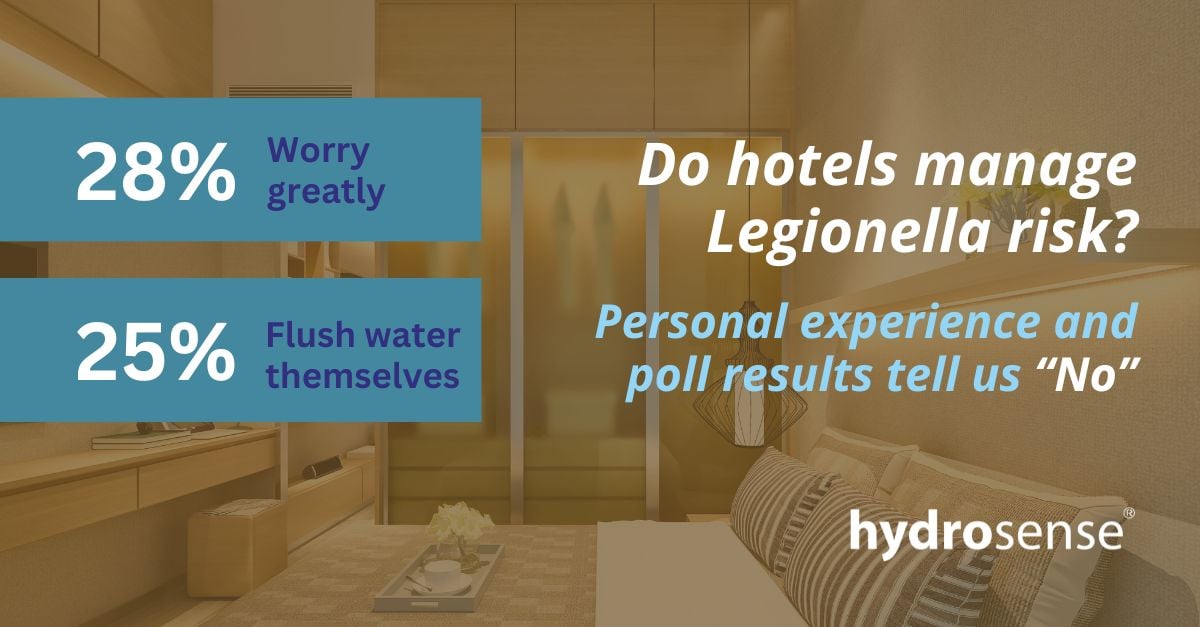
Water quality in hotels is more than a matter of taste or clarity—it's a significant health concern that can't be overlooked. Recently, an eye-opening experience by the Hydrosense team at a major water event in Amsterdam shed light on the stark reality of Legionella risks in hotel accommodations.
Hydrosense PRO, an ultra-rapid Legionella test, revealed a positive result for Legionella pneumophila serogroups 1-15 from a water sample taken in the team's hotel room. When reported, the hotel's immediate action was to move the team member to a different room and test the shower, which tested negative. However, a subsequent murky water sample from the tap in the new room tested positive for the same serogroups. Alarmingly, this suggested a potential widespread issue.
The hotel's duty manager's response was uncertain at best, revealing a concerning lack of a Legionella risk management plan and routine water flushing practices. This incident underscores the urgent need for the hotel industry to implement rigorous water quality and Legionella testing standards.
But this isn't an isolated concern. Another hotel room in Edinburgh was also tested using our Hydrosense PRO test kit and that too was found to be positive for Legionella pneumophila serogroups 1-15.
Add to this, a recent LinkedIn survey highlights the public's wariness about the hotel industry's handling of Legionella risks. With 28% of respondents worrying greatly and only 38% assuming that water is routinely tested, it's evident there's a trust deficit that hotels need to address.
The Implications of Inadequate Water Safety Measures
The consequences of neglecting water safety are grave. Legionella bacteria, when inhaled through mist or vapor, can cause Legionnaires' disease—a severe form of pneumonia that can be fatal if not treated promptly. The disease's nonspecific symptoms often lead to misdiagnosis, making prevention through water safety all the more critical.
How Can Hotels Improve?
Develop a Comprehensive Legionella Risk Management Plan: Hotels must establish clear procedures for regular testing, risk assessment, and remediation strategies to manage and mitigate the risk of Legionella.
Educate Staff: Every hotel should have a dedicated “Responsible Person” who is trained and responsible for Legionella control. This person will be in charge of the Legionella Risk Management Plan and ensure it is carried out as intended. In addition, all hotel staff should be trained on the signs of potential Legionella contamination and have basic knowledge in order to meet the requirements of any hotel guests who wish to gain a better understanding of the water safety measures taken in the hotel to keep them safe.
Check Water Temperature: Hot water should be stored at a minimum of 60°C and circulate above 50°C, whilst cold water should remain below 20°C to prevent growth of Legionella. Regular temperature checks should be carried out throughout the hotel and any out of specification results should be acted upon.
Implement Regular Water System Flushing: Stagnant water is a breeding ground for Legionella. Regular flushing of the water system, especially in low-occupancy periods, can help prevent bacterial growth. All taps and showers in unoccupied rooms should be flushed at least once per week to prevent stagnation from occurring.
Regular Cleaning, Descaling and Disinfection: Showerheads, hoses and taps should be cleaned regularly and kept free from scale. Filters should also be cleaned and disinfected often and storage tanks inspected every 1-3 months.
Invest in Rapid Testing Technology: Utilising rapid testing solutions like Hydrosense PRO can enable immediate detection and swift action, minimising the risk to guests and staff. This could be useful in instances where controls have gone out of specification (e.g. water temperature), where an interruption in the supply of water has occurred (e.g. from remedial work within the hotel), or where there are signs of biofilm (slimy deposits) or contamination (e.g. murky water) is suspected.
Additional Checks: The above measures provide a basic level of safety which all hotels should be carrying out. In hotels which contain further sources of risk associated with Legionella bacteria such as hot tubs, swimming pools and decorative fountains then additional checks on these should also be carried out .
A Duty to Protect
The hospitality industry has a duty to protect its patrons from health hazards, including those posed by Legionella. The experience of the Hydrosense team serves as a wake-up call for the industry at large. It's not just about adhering to regulations; it's about exceeding them to ensure guest safety and trust.
In conclusion, it's clear that the hotel industry must take decisive action to improve water quality and safety. By adopting stringent testing standards and transparent practices, hotels can not only safeguard the health of their guests but also restore confidence in their commitment to guest welfare.

